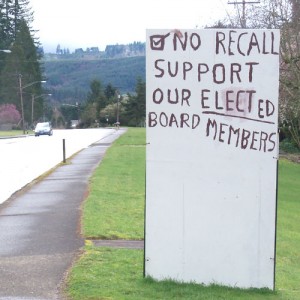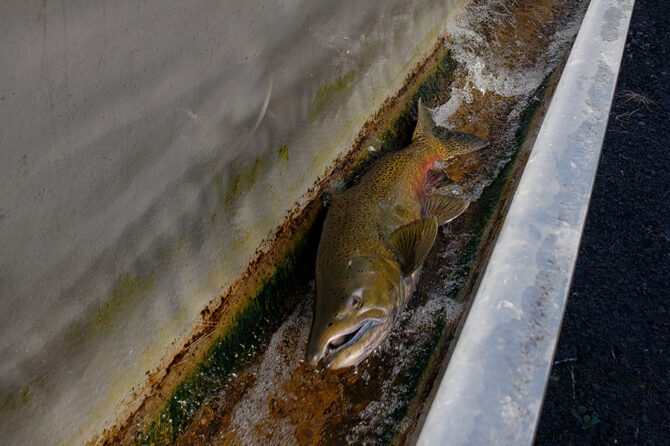Tension persists after citizens in the Lyons-Mehama Water District by a margin of three to one voted not to recall the water district board in a special election April 12.
“I’ve lived here for 40 years and I’ve never seen the community so divided,” Lyons City Councilor Troy Donohue said.
Now, between the fees for legal counsel and the special election recall, Water District Board Chairman George Geddes said the water district is footing a bill of about $12,000.
The water district may have to cut expenses and/or raise water rates, he said.
Geddes said the recall group and city council members started the battle but “we have to pay for it.”
Mayor Doug Morgan said the city may pursue a franchise agreement with the water district, which would give the city more direct oversight of its operations.
Geddes said the water district would resist a franchise. Here is a chronological look at what has happened:
Water System Surveys
In August 2010, the Oregon Health Authority Drinking Water Program conducted a routine Water System Survey, which showed several “significant deficiencies” and various due dates for corrections.
Deficiencies included lack of documentation for some protocols and sampling plans. Other deficiencies were more complicated: low pressure in a few locations and the lack of a map of the cross-connections in the 56-year-old system, not all of which are known.
One deficiency, inadequate measuring and recording of chlorine in distribution, required “immediate” correction.
This March, the Lyons-Mehama Water Treatment Plant was again surveyed. Inspections are conducted every six months, once a year, or three years, depending on how well the plant is operated and maintained.
According to the survey cover letter from the DWP, the water district has been placed on the lowest level of supervision and the next inspection will be in three years.
One deficiency is still outstanding: “some standard operating procedures remain unwritten.” The letter also listed the other deficiencies from the previous survey, which have either been corrected or are on schedule to be corrected. The survey is available at the water district’s website: lmwd.webs.com.
City Council steps in
Lyons City Councilors reviewed the August survey at a special meeting in September 2010. According to the minutes, the council viewed the water district as chronically non-compliant, and decided to send out a letter alerting the community of the deficiencies listed in the water system survey.
The water district is overseen by the DWP through inspections and technical assistance. The water district and the city of Lyons are separate government agencies.
In December, DWP manager Karen Kelley attended a water district board meeting to answer questions. She recalls telling citizens, “We have approximately 3,500 public water systems… and of these, we only have only around 30 [less than 1 percent] Outstanding Performers [in which] the water system cannot have any significant deficiencies and no more than one violation on their compliance record.”
Concerned Citizens
Local daycare owner Tamara Craft was concerned about the city’s letter. When she contacted the water district, she was told it was compliant with DWP. When she contacted the city she was given details on the August 2010 survey.
“I felt like I was lied to by the water department,” Craft said.
She eventually joined the Concerned Citizens for Safe Water, a group composed of citizens and some city councilors. Dissatisfied with the water district’s performance, the group
initiated the petition to recall all five water district board members.
Craft speculated the board members had “gotten kind of relaxed” and CCSW gave them a constructive “kick in the pants.”
Jolene Kincaid, a business owner in Lyons, also joined CCSW.
“I fully believe the recall failed because people were voting based on emotions and personality and not the issues,” she said.
The CCSW has officially disbanded; their chairman, Dennis Hoop, declined to comment.
Recall aftermath
In response to demands for better communication and transparency, the water district created a website and released a statement drafted by water district’s attorney Jennifer Niegel which said, “A few issues were blown out of proportion by a small group of individuals [who] implied that the water district’s water was unsafe. The water has been and continues to be safe.”
Superintendent Bill Grimes, who runs the Water Treatment Plant, declined to comment on CCSW: “I think the less we say, maybe the sooner this will be over.”
Water district board chairman George Geddes said between the special recall election and the fees for legal counsel, the water district is facing $12,000 in unbudgeted expenses.
Grimes said money will have to come from cutting back expenses and/or raising the price of water.
“[CCSW and the city] started it and brought it on but we have to pay for it,” Geddes complained. “We were working on [correcting deficiencies] before we got viciously attacked… they just wouldn’t leave it off. They called us names, said we were old, uneducated, didn’t have the knowledge to do [the job]. The whole thing was built on deceit and over-zeal.”
City maintains accountability posture
After the failed recall and positive inspection results, Mayor Doug Morgan said the council still feels responsible to “monitor what happens within our city borders.” He said the city holds the water district accountable for its services the same way the city oversees the other franchised utilities.
When asked to define “monitor” as opposed to “oversee,” Morgan said the city does not want to conduct inspections or surveys, but wants to hold the water district accountable for financial transparency and compliance by “monitoring those entities that do the oversight.”
A couple hours after this statement, in the city council meeting, Morgan defended a decision by councilor Lon Conner to obtain muddy water from a fire hydrant and use city funds to pay for an analysis of the sample.
The council’s newest member, Troy Donohue was the most vocal critic of the action, which was done without the council’s approval: “This is not monitoring. This is being active.”
Donohue further argued that taking water from a fire hydrant without a meter made the city “complicit in theft.”
Councilor Dan Burroughs agreed, “It’s not right to open a hydrant. It’s not legal… Sounds to me like it’s more for the Concerned Citizens than the city.”
Conner declined to comment on his actions. The council was asked how it plans to restore good relations in the community, especially toward the water district. No one commented.
Morgan said the city is going to pursue a franchise agreement with the water district, which will give the city more direct oversight; Geddes said the water district will resist franchise.



